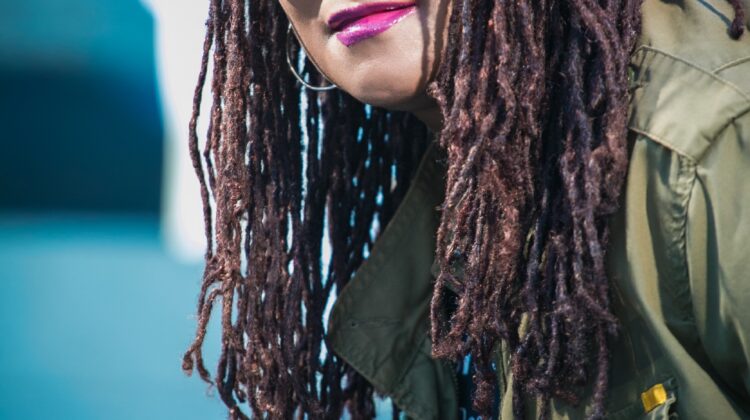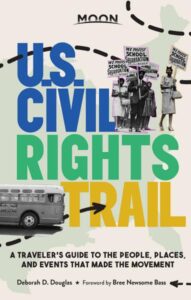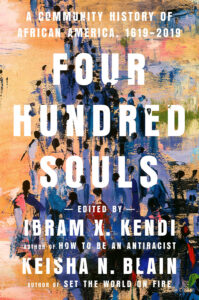

Two recently published works have ties to Covington that some may not expect.
Deborah Douglas, an award-winning journalist who lived in Covington as an adolescent and teen, has written the Moon Travel Guide U.S. Civil Rights Trail: A Traveler’s Guide to the People, Places, and Events that Made the Movement.
Published last month, the book focuses on 10 stops along the Civil Rights Trail and gives readers flexible itineraries, historic Civil Rights sites, the culture of the movement, expert insight for engagement with each community, tips on where to stay and eat, and detailed coverage of the cities included.
It reads like a friend’s travel recommendation, not a stuffy guidebook, and captures the importance of each location.
“The official Civil Rights Trail goes as far east as Wilmington, Delaware and as far west as Kansas, because of Brown v. Board (of Education), and it goes into Louisiana and Florida. I focused on 10 places in the South that captured the narrative arc of the mid-century Civil Rights Movement.”
The Memphis section includes the iconic Lorraine Motel, which is now the National Civil Rights Museum, where Dr. Martin Luther King Jr. was killed. She also shares information about other notable landmarks, like the Stax Museum, I Am A Man Plaza, Withers Collection Museum and Gallery and Clayborn Temple.
Douglas encourages you to visit Black businesses, like Chef Tam’s Underground Café and Cheryl Pesce: The Lifestyle Store, and watch a show at the Hattiloo Theatre, for example.
There are detailed maps and beautiful, full color photos which make you want to hop in the car and grab a plate of fried chicken from The Four Way.
It’s a travel guide you won’t want to miss out on reading.
Douglas is also included in the anthology Four Hundred Souls, which was published last week. Edited by Ibram X. Kendi and Keisha N. Blain, it is a community history of African-America from 1619-2019 and features pieces by nearly 100 writers the editors call “the most vital and essential voices of our present.”
Writing about the Hurricane Katrina era and the way Black women were expected not to take up space, she relates their experience to experiences she had in Covington.
“Whatever light of intellect, curiosity and hope emanated from me and Black girls like me needed to be dispatched,” she wrote, “This is what I call ‘depresencing.’”
Taking up space in Covington

When you ask Deborah Douglas if she’d ever thought she’d be the journalist she is today she says, without hesitation, “Yes.”
She’s unapologetic in her confidence and she’s unapologetic about taking up space.
“When I came down to Covington I think I was a little different,” she says.
Douglas was born in Chicago and spent her early childhood in what she calls post-uprising Detroit, Mich.
“There was a revolutionary zeal in the air, even as a little kid I knew there was something special. And when I came down to Covington I think I may have been a little bit different only because I think I had these radical teachers that said girls should always raise their hands, they wanted me to take up space and be present and then when I came to the South it was different.”
Douglas moved to Covington with her grandmother, Louise Purham, and attended Covington Elementary in the 7th and 8th grades and Covington High School from 9th through 11th grade.
“Girls were quieter and the idea of raising your hand and taking up space wasn’t something that was expected, so I stuck out immediately.”
She was part of the Class of 1985, was a cheerleader and member of the homecoming court, but finished high school in Detroit.
She remembers bank tellers calling her grandmother by her first name only – not Ms. Louise or Ms. Purham – and it’s something she’s never forgotten.
“I thought that was so rude. I wanted to pipe up and say something, but she would squeeze me under the counter. Her money was in the bank and she felt vulnerable. I didn’t want to say anything because that would terrorize her further, because really it was like a form of racial terror for them to denigrate her further without putting a handle on her name. Even though they said it in a sweet kind of way, it was really just disrespectful.”
She also remembers the guidance of Hattye Yarbrough, who was the school librarian at Covington High School at the time and a beloved member of her church.
“Mrs. Yarbrough fueled my interest in all things Black history through school and church. I used to get permission to go to the library and ask her questions and then we would go on these library odysseys. She would show me all of these books … even art, she had me reading Dostoevsky.”
Douglas also credited Yarbrough with encouraging her plans to pursue journalism as a career.

“A lot of people said, ‘Oh, journalists don’t make that much money …’ and instead of telling you what to think or pronouncing her opinion about my choice, she said, ‘Let me show you how to research what you want to do so you know how you need to prepare for it now and in college. She showed me how to look up salary projections so I could see how much money to expect. She’s a big part of my story and fueling my passion and my curiosity for all things history and books.”
Finding her story
When she was eight years old, Douglas decided she wanted to be a journalist. At age 10, she decided she wanted to go to Columbia University.
She ended up attending Northwestern, working at TIME Magazine as an undergrad student, interned at the Chicago Sun-Times and the Commercial Appeal, amongst others. Her first full-time job was in Jackson, Miss.
She decided early on that she didn’t want to just check off the boxes that everyone else was checking off as well.
“You need to have a story, you need to have something that sets you apart. So I started out early on trying to figure out my beat, what made me special.”
She took advantage of a lot of opportunities, became the editor of the Sun-Times, and kept looking to improve her standing.
“It just wasn’t enough to say, ‘Oh, I’m in media, I’m a journalist,’ and just be a cog in the wheel. I needed to have a special story.”
Her story includes writing about equity and justice and teaching others to do so as well.
Now based in Chicago, she is a Studs Terkel Award winner and has served as the DePauw University Eugene S. Pulliam Distinguished Professor of Journalism.
She was a founding managing editor with the MLK50: Journalism Through Justice project in Memphis and is currently a senior leader of The OpEd Project, which is a global initiative to amplify underrepresented voices.
She’s traveled the world as a journalist and still remembers Covington very fondly. She’d like to encourage the younger generation to be themselves and take up space.
“There’s a very narrow definition of what constitutes success, but now the world is meant for all kinds of minds. Even the kids who couldn’t sit still, there’s a place for them in the world, too. You have find the place that fits how you show up in the world. ”
For more, see debofficially.com.





Leave a Reply